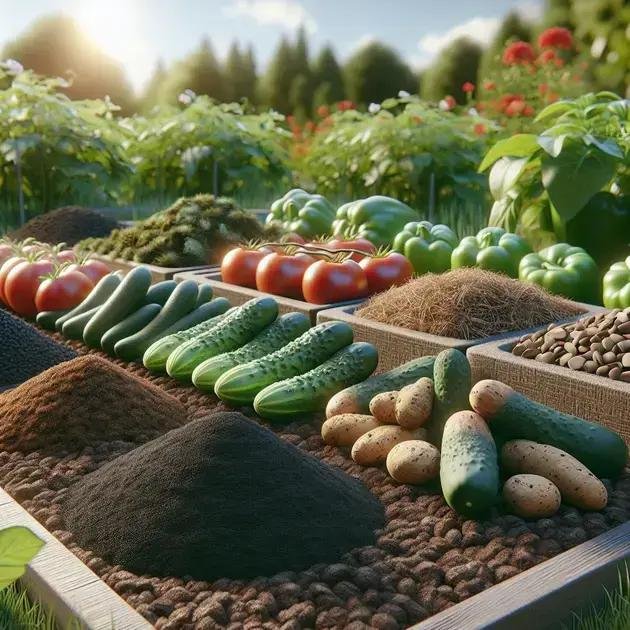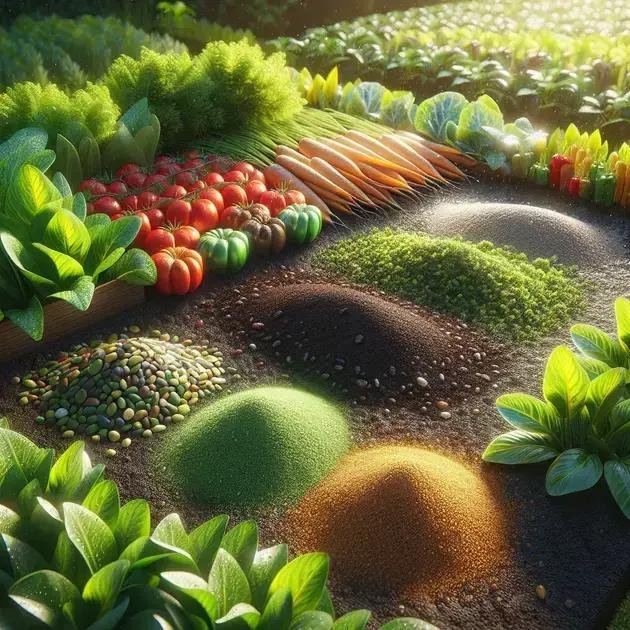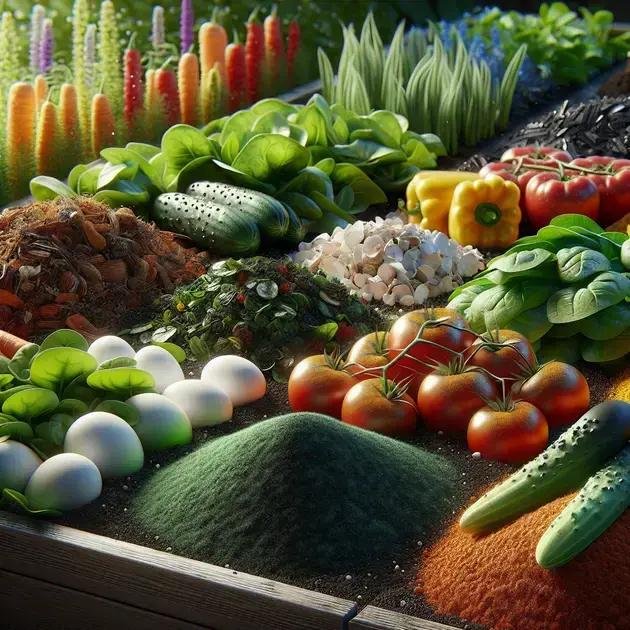Organic fertilizers naturally enhance soil health and plant growth by improving soil structure, boosting microbial activity, and providing essential nutrients without chemical additives, making them a sustainable choice for any garden.
Organic fertilizers can be the secret ingredient to transforming your home garden. Ever wondered why your plants aren’t thriving? They might just need the right nutrient boost. It’s all about finding that perfect balance to enrich your soil naturally.
why choose organic fertilizers?
When gardening enthusiasts ponder the best way to nourish their plants, many come to realize the benefits of choosing organic fertilizers. These natural soil enhancers not only feed plants but also enrich the ecosystem in your garden. Unlike chemical alternatives, organic fertilizers improve the soil structure, enhancing its ability to retain water and nutrients. This can be especially beneficial for those with sandy or clay-heavy soils.
Benefits for the Environment
Organic fertilizers are a boon for the environment. They reduce the dependence on fossil fuels and minimize harmful chemical runoff that can pollute water bodies and harm aquatic life. By using organic options, gardeners contribute to a healthier ecosystem.
The choice to go organic aligns with sustainable practices. It ensures that gardeners nurture not just their plants but the soil and surroundings, fostering a thriving environment for future generations. By opting for organic fertilizers, you’re supporting biodiversity, promoting healthy soil microbes, and encouraging a thriving garden ecosystem.
top 5 organic fertilizers

Choosing the right organic fertilizer is key to achieving a lush and productive garden. Here are the top five options to consider:
1. Compost
Compost is often called black gold for a reason. It enriches the soil with nutrients and organic matter, improving soil structure and fertility. Homemade compost can be made from kitchen scraps and yard waste.
2. Manure
Animal manure, whether from cows, chickens, or horses, is a rich source of nutrients. It must be well-composted to avoid burning plants. Manure enhances microbial activity in the soil.
3. Bone Meal
High in phosphorus, bone meal is excellent for flowering plants and vegetables. It supports strong root development and promotes lush blooms.
4. Fish Emulsion
A liquid fertilizer derived from fish waste, fish emulsion is a fast-acting option that provides a nutrient boost. It’s particularly beneficial in the early growth phases.
5. Seaweed
Seaweed fertilizer contains a broad range of trace elements, hormones, and nutrients that are beneficial for plant growth. It enhances plant vigor and stress resistance.
how to apply organic fertilizers effectively
Applying organic fertilizers effectively requires understanding the needs of your plants and the characteristics of your soil. Start by testing your soil to determine its nutrient deficiencies. This will guide you in selecting the most appropriate fertilizer and application rate.
Timing is Key
Apply fertilizers during the growing season when plants can actively absorb nutrients. For most types, early spring and the beginning of the growing season are ideal.
Consider the application method that suits your garden best. Broadcasting involves spreading the fertilizer evenly across the soil surface, while side-dressing involves placing it next to growing plants. Incorporating fertilizers into the soil—particularly for new plantings—ensures these nutrients are readily available for roots.
Watering Effectively
After applying organic fertilizers, watering helps nutrients penetrate the soil and reach plant roots. Be cautious not to overwater, which can cause runoff and nutrient loss.
Adjust your application based on plant response. If growth is lush and green, reduce further applications. If plants show signs of deficiency, consider adding supplemental feeding.
benefits of organic fertilizers on soil health

Organic fertilizers play a crucial role in enhancing soil health. They improve the soil’s structure, allowing for better air and water movement, which is essential for root growth. By adding organic matter, these fertilizers increase soil’s water retention capacity, making it perfect for areas with less frequent rainfall.
Supporting Microbial Activity
One of the greatest advantages of organic fertilizers is boosting microbial activity. Beneficial microbes break down organic matter and release nutrients in forms that plants can absorb easily. This natural process fosters a thriving ecosystem within your soil, helping to suppress diseases and pests.
The natural components of organic fertilizers also minimize soil erosion. By binding the soil particles, they reduce runoff and keep the soil intact, even during heavy rain. This not only protects your garden but also prevents nutrients from being washed away, ensuring they remain available for plant use.
Long-Term Soil Fertility
Unlike chemical alternatives, organic fertilizers build up the soil over time. This means they not only provide essential nutrients immediately but also improve the soil for future crops. As a result, gardens using organic methods often require fewer amendments over the long term, making them more sustainable.
common mistakes when using organic fertilizers
Using organic fertilizers effectively requires knowledge and care to avoid common pitfalls. One frequent mistake is overapplication. While these fertilizers are natural, using too much can still damage your plants and disrupt soil balance.
Incorrect Timing
Applying fertilizers at the wrong time can lead to wasted nutrients. Plants are most receptive when they are actively growing, so adding fertilizers during dormancy can be ineffective. Knowing the growth cycle of your plants ensures that nutrients are available when they are needed.
Another mistake is overlooking soil testing. Without understanding what your soil lacks, you may apply the wrong type of fertilizer. This not only wastes resources but can also lead to nutrient imbalances that affect plant health.
Ignoring Instructions
Each organic fertilizer has its own set of application guidelines. Ignoring these, such as applying to dry soil or not watering in, can reduce effectiveness. Pay attention to the specifics of each product to ensure you’re reaping the full benefits.
Lastly, forgetting to account for the weather can impact results. Applying fertilizers before heavy rains can cause runoff, washing nutrients away before they can be absorbed.
where to buy organic fertilizers

Finding the right place to purchase organic fertilizers can make a significant difference in your gardening success. Local garden centers are an excellent starting point. They often carry a variety of organic fertilizers suited to the local climate and soil conditions.
Online Stores
For convenience and variety, online retailers offer a vast selection. Websites like Amazon and specialized gardening stores provide numerous options to compare prices, ingredients, and reviews. Ordering online allows gardeners to access products not available in local stores.
Farmers’ markets are another great source. Many local farmers sell organic fertilizers, such as compost or manure, that are freshly prepared. Purchasing directly from farmers ensures that you get high-quality, often more affordable, fertilizers.
Specialty Shops
For unique and hard-to-find products, specialty garden shops and co-ops often have exclusive products you won’t find elsewhere. These stores focus on eco-friendly and sustainable options, offering personalized advice and support.
When purchasing, always read the labels thoroughly to ensure the product meets your garden’s needs. This helps you choose fertilizers that are genuinely organic and suited for your plants.
Why Choose Organic Fertilizers for Your Garden
Organic fertilizers are an effective and sustainable way to enhance your garden. They improve soil health and encourage plant growth naturally.
By selecting the right type of organic fertilizer, applying it correctly, and purchasing from reliable sources, you ensure that your garden remains healthy and productive.
Avoid common mistakes like overapplication and incorrect timing for the best results. When used wisely, organic fertilizers can transform your garden.
Embrace the benefits of organic gardening and create a thriving, eco-friendly outdoor space.





